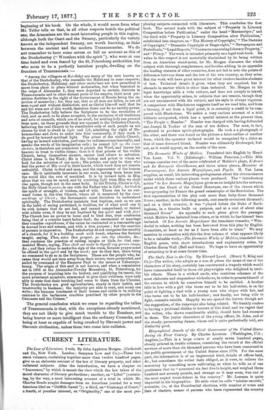CURRENT LITERATURE.
The Law of Literature. 2 vols. By John Appleton Morgan. (Cockcroft and Co., New York. London : Sampson Low and Co.)—These two stout volumes, containing together more than twelve hundred pages, give us an elaborate account of the law of literary property, and other collateral subjects. After the introduction, we have a chapter on "Innocence," by which is meant the view which the law takes of the Moral character of literary productions; another, on "Libel" (contain- ing, by the way, a most interesting account of a trial in which Mr. Charles Heade sought damages from an American journal for a very ferocious libel on "Griffith Gaunt "); a third, on" Contempt of Court ;" a fourth, of peculiar interest, on "Originality," one of the most per-
plexing subjects connected with literature. This concludes the first book. The second deals with the subject of "Property in Literacy
Composition before Publication," under the head " Manuscripts ;" and the third with "Property in Literary Composition after Publication,"
subdivided into chapters on "The History of Copyright," "The Statutes of Copyright," "Dramatic Copyright or Stage-right," "Newspapers and Periodicals," "Legal Reports," "Contracts concerning Literary Property,"
and "Piracy." The work is intended primarily as a legal text-book. Its value in this respect is not materially diminished by its being written from an American stand-point, for Mr. Morgan discusses the whole subject with thorough completeness, and besides adding in an appendix the leading statutes of other countries, does not fail to note the points of difference between them and the law of his own country, as they arise. But the work will have great interest for other readers besides students of law. Technical details it gives when they are required, but it abounds in matter which is other than technical. Mr. Morgan to his legal knowledge adds a wide culture, and does not scruple to travel, when the opportunity arises, to subjects that are remote, though they are not unconnected with his subject, and his style is always vigorous. A comparison with Blackstone suggests itself as we read him, and from a literary, if not from a legal point, it is certainly a credit to be com- pared with Blackstone. We notice a very curious account of a trial hitherto unreported, which has a special interest at the present time, "The People v. Mumler." Mumler was charged with having defrauded one Joseph H. Tooker of the sum of ten dollars. The man, in fact, professed to produce spirit-photographs. He took a a photograph of the sitter, and there was found on the picture a faint outline of another form, which the operator declared would be recognised by a sitter as that of some deceased friend. Mumler was ultimately discharged, but not, as it would appear, on the merits of the case.


































 Previous page
Previous page